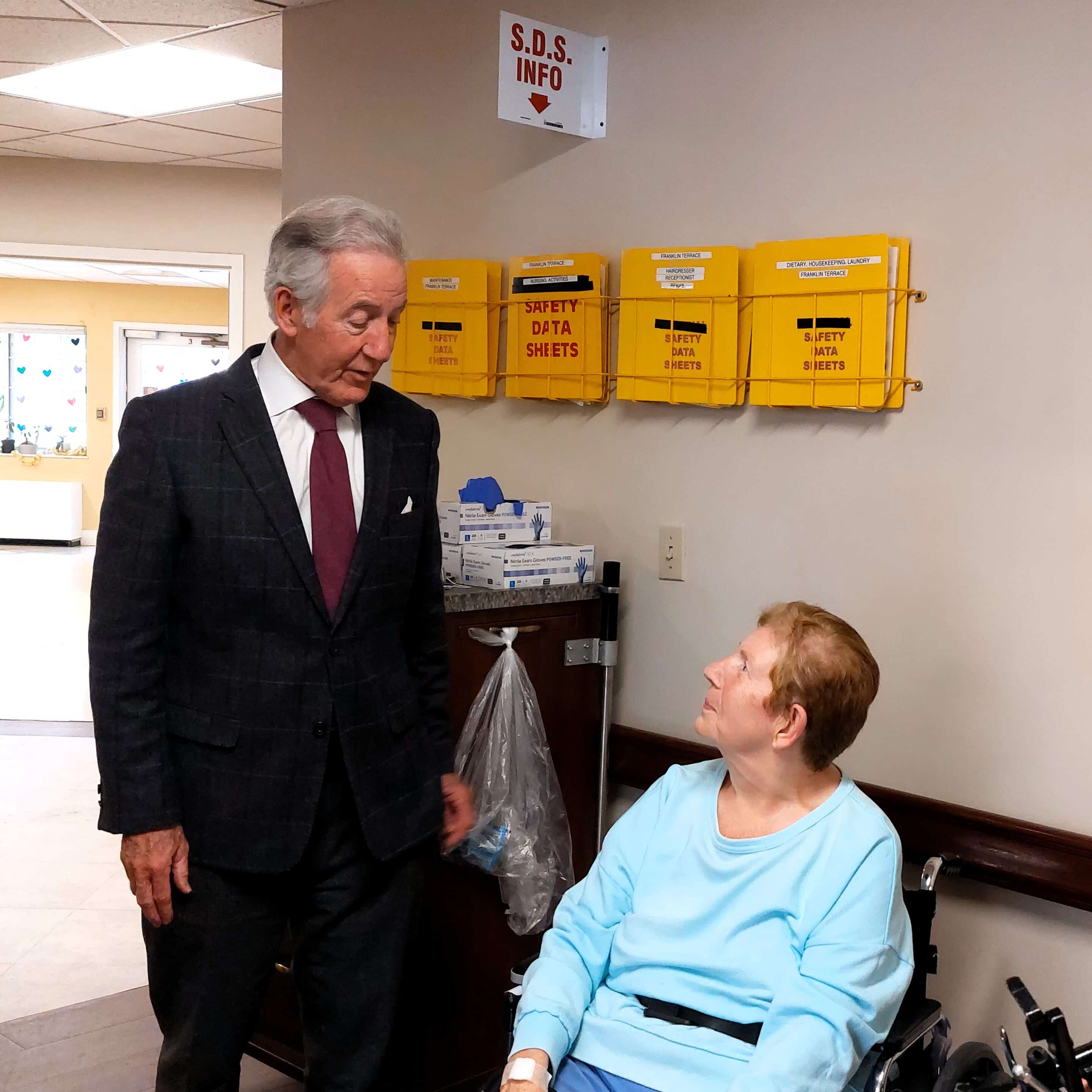U.S. Rep. Richard Neal greets Lauretta Ford, a resident at Life Care Center of Wilbraham.
Reminder Publishing photo by Sarah Heinonen
WILBRAHAM — U.S. Rep. Richard Neal visited Life Care Center of Wilbraham, a skilled nursing and rehabilitation facility, to discuss how potential cuts to Medicaid, Medicare and Social Security would impact long- and short-term care providers and their clients.
The April 14 visit came as President Donald Trump’s administration has a federal budget reconciliation bill that has sparked controversy in the U.S. House of Representatives, in part, due to plans to include cuts and work requirements to Medicaid, the federal program that provides medical care to low-income Americans. The Trump administration has already announced it would not renew or approve new Medicaid funding for designated state health programs in eight states, including Massachusetts.
In Massachusetts, Medicaid is better known as MassHealth. “Throughout Massachusetts, 48% of adults are at risk of losing their health coverage due to the proposed Medicaid work requirements,” Neal’s team shared in a press release after his visit. Across the state, there are 1.6 million residents on Medicaid, including 330,000 in Neal’s Western Massachusetts district.
While Speaker of the House Mike Johnson has stated that there will be no cuts to Medicare benefits, House Republicans passed an April 10 budget resolution directing the House Energy and Commerce Committee to cut $880 billion in federal programs. According to the Congressional Budget Office, “Outlays other than for Medicaid total $581 billion through 2034,” meaning that cuts to Medicaid would be needed to reach the $880 billion goal.
Life Care Center of Wilbraham is a 123-bed facility with two long-term care units that serve residents for as long as three years and one unit. On average, of those receiving care at the facility, 58% are Medicaid recipients, 22% are on Medicare, 10% pay through their insurance and 9% are private payers.
“There are real stories behind the statistics. It impacts real people in a living condition and stage of their lives,” Neal said. At Life Care Center of Wilbraham, Neal knew several of the people and their stories, including a one-time schoolteacher of his and a woman who was a precinct captain in Springfield during the representative’s tenure as mayor of the city.
“This proposed reduction in Medicaid funding would affect Life Care Center of Wilbraham’s ability to provide the highest quality of care and services to our Medicaid residents, who compose over 50% of our daily [patients],” said Dennis Lopata, executive director of Life Care of Wilbraham.
Speaking with a group of residents at Life Care of Wilbraham, Neal said, “I’m reminded of what extended family looks like. Nobody gets left behind.” Medicaid began as a program to care for children, and later, people with disabilities and low-income adults. The average age of people on the program is 80 years old.
“The notion that we are going to take away health care from women, children, seniors and individuals with disabilities to finance a tax cut for the wealthy is reprehensible,” Neal said in the press release.
Amid the talks of cuts to Medicaid and Medicare, a 5.1% rate increase for Medicare Advantage, private insurance plans approved by Medicare, were approved by the Trump administration.
However, Tara Gregorio, president of the Massachusetts Senior Care Association, said Medicare Advantage programs pay less than Medicare. She said, “As people get more frail and sick, it’s harder to get money out of [Medicare Advantage]. It’s not something I think people realize when they sign up. We need stronger consumer protection.”
Neal said explaining Medicare to the public is challenging. He said, “The guarantee of Medicare [is], you turn 65, you’re in. If you’ve got a chronic disease and you’re 70, no [private] plan is going to cover you.”
Gregorio remarked, “You don’t know what you’ve got until it’s gone.”
Neal later told Reminder Publishing what he felt was the downside of private programs. “You lose the government guarantee,” he said. If people are frustrated or treated unfairly under the federal programs, “You get to call your congressman. If it goes private, you lose that ability.” He said there is no one to hold accountable in the same way. “I certainly won’t vote to privatize it,” he added.
Neal opined that voting against Medicaid is not in the best interest of House Republicans. “There are some red states that derive most of their care from Medicaid. One in three people in Missouri are on Medicaid or Medicare.” On April 16, 12 moderate Republicans stated they would vote against the bill if it included cuts to Medicaid.
Neal teased upcoming Democratic proposals to address updates to Medicaid and Medicare, but did not share any details.
While visiting the facility, Neal also discussed other safety-net programs, like Social Security. He said that when errors or waste is found in programs, Democrats are “all in favor of correcting it.” However, he also pointed out that Social Security fraud represents just .5% of claims.
Neal said Social Security is “the reason your mother and father aren’t living in your attic.” He also flatly dismissed the idea of Social Security “not being there” for people when they become old enough to collect.



